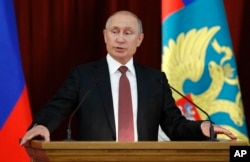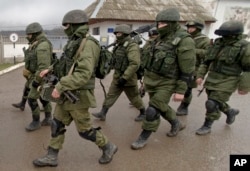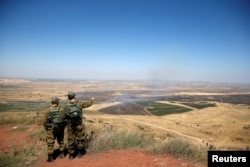President Donald Trump and Russian leader Vladimir Putin are defending their summit in Helsinki, saying the two hours of talks yielded progress on a range of issues, but disclosing few details.
"With all the difference in views, we agreed that Russian-American relations are in an extremely unsatisfactory state. In many ways, even worse than during the Cold War," Putin said Thursday. "Of course, it would be naive to believe that the problems which accumulated over the years will be resolved in a few hours. No one expected it. Nevertheless, I believe that the path to these positive changes has started."
Washington and Moscow have long been adversaries. Putin and Trump say they want to improve ties by increasing collaboration: in cybersecurity, military relations, counterterrorism, nuclear weapons reductions, business relations and the arts.
The specifics remain unclear. Here's a summary of what we know:
Joint investigations
President Trump called Putin's offer to work with U.S. investigators on the inquiry into Russian meddling in the 2016 vote an "incredible offer."
In return for helping American investigators question Russian military officers charged with participating in cyber crimes as part of the covert effort, Putin said Russia would want help questioning British investor Bill Browder and the former U.S. ambassador to Russia, Michael McFaul as part of an alleged corruption scheme. Both are longtime Putin critics.
Browder was involved in lobbying the U.S. Congress to pass the Magnitsky Act, which freezes hundreds of millions of dollars of assets held by Kremlin-linked businessmen.
"So I have great confidence in my intelligence people, but I will tell you that President Putin was extremely strong and powerful in his denial today," Trump said Monday. "And what he did is an incredible offer; he offered to have the people working on the case come and work with their investigators with respect to the 12 people. I think that's an incredible offer."
White House spokesperson Sarah Sanders was asked about the interrogation cooperation Wednesday, and specifically whether Putin raised questioning former American ambassador McFaul.
"There was some conversation about it, but there wasn't a commitment made on behalf of the United States. And the President will work with his team, and we'll let you know if there's an announcement on that front," Sanders said.
"The overall assertions that have come out of the Russian Government are absolutely absurd," State Department Spokesperson Heather Nauert said Wednesday. "The fact that they want to question 11 American citizens and the assertions that the Russian government is making about those American citizens — we do not stand by those assertions that the Russian Government makes."
Military cooperation
Trump and Putin discussed military cooperation on issues like nuclear weapons treaties and coordinating operations in Syria.
"The Russian Defense Ministry is ready to enliven contact with the U.S. colleagues, between our General Staffs and via other communication channels, to discuss extension of the START Treaty, cooperation in Syria, and other topical issues of military security," Russian spokesman Igor Konashenkov said Tuesday.
"We also agreed that representatives from our national security councils will meet to follow up on all of the issues we addressed today and to continue the progress we have started right here in Helsinki," Trump said Monday.
Ukraine
The United States has opposed Russia's annexation of Crimea and invasion of eastern Ukraine. However, Trump did not publicly raise the issue in his remarks following the summit. Instead, Putin said the two sides discussed how to implement the 2015 Minsk Protocol agreement aimed at halting fighting.
“President Trump’s position on Crimea is well known, and he stands by it. And he maintains that integrating Crimea into the Russian Federation was an illegal act. We have a different point of view. We believe that we conducted a referendum [there] in strict compliance with international law, with the statutes of the United Nations. For us, for the Russian Federation, this is a closed matter," Putin said Monday.
"While we discussed the internal Ukrainian crisis, we paid special attention to the bona fide implementation of Minsk Agreements by Kyiv," he added. "At the same time, the United States could be more decisive in nudging the Ukrainian leadership and encourage it to work actively on this."
Syria
The two presidents highlighted Syria as a situation with conditions that favored increased collaboration.They provided few details.
"We both spoke with Bibi [Israeli Prime Minister Benjamin] Netanyahu, and they would like to do certain things with respect to Syria having to do with the safety of Israel," Trump said Monday. "So in that respect, we absolutely would like to work in order to help Israel, and Israel will be working with us. So both countries would work jointly."
"As far as Syria is concerned," Putin said Monday, "the task of establishing peace and reconciliation in this country could be the first showcase example of this successful joint work. Russia and the United States apparently can act proactively and take - assume the leadership on this issue, and organize the interaction to overcome humanitarian crisis, and help Syrian refugees to go back to their homes."
General Joseph Votel of U.S. Central Command was asked Thursday if he has any information about what was agreed to on Syria.
"The direct answer is no," he replied. "I have not been asked to do anything along those [lines]. I am not privy to any grand bargain."









